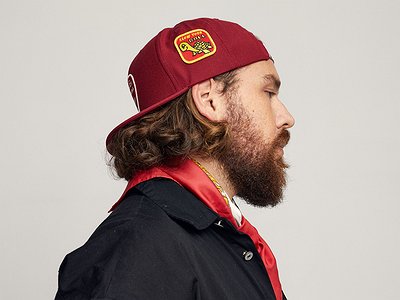Name: Nico de Andrea
Nationality: French
Occupation: Producer, DJ
Current release: Nico de Andrea's Love Therapy is out via Kontor / Armada.
Recommendations: SADE - "Immigrant"; MELODY GARDOT - "Les Étoiles"
If you enjoyed this Nico de Andrea interview and would like to keep up to date with his music, visit him on Instagram, Soundcloud, twitter, and Facebook.
For insights from some of his collaborators, read our Cherry Lena interview, our Themba interview, our Franky Wah interview, our Andrea Oliva interview, and our LP Giobbi interview.
When I listen to music, I see shapes, objects and colours. What happens in your body when you're listening? Do you listen with your eyes open or closed?
I always listen to music with my eyes wide open. Some landscapes, some sunsets, some encounters can take on a different dimension when you listen to a piece of music while looking at them.
I’m really emotional so my heart beats faster when I listen to something minor and melancholic.
Entering new worlds and escapism through music have always exerted a very strong pull on me. What do you think you are drawn to most when it comes to listening to and creating music?
When I compose music, I am primarily drawn to speaking out and expressing emotions that I can't quite convey with words.
Even though I’m a happy person, everything I compose comes from a failure or a sad moment.
What were your very first steps in music like and how would you rate the gains made through experience?
As a DJ, I simply started producing my own music when I couldn't find tracks on the market that I truly enjoyed playing. I felt like something was missing.
I’ve learned that having a signature sound is key.
According to scientific studies, we make our deepest and most incisive musical experiences between the ages of 13-16. What did music mean to you at that age and what’s changed since then?
Starting my career at the age of 14, the passion remains unchanged. The only thing that truly changed is realizing I could make a living from this passion.
It required keeping the flame of the early days while becoming more professional.
How would you describe your own relationship with your instrument, tools or equipment?
For me, it's like a good friend to whom I can entrust secrets.
Where does the impulse to create something come from for you? What role do often- quoted sources of inspiration like dreams, other forms of art, personal relationships, politics etc play?
On this album, the sources of inspiration are very personal – a divorce, the distance from my son, the loss of my older brother.
It was challenging but crucial for me.
Are you acting out parts of your personality in your music which you couldn't or wouldn't in your daily life? If so, which are these? What, would you say, are the key ideas behind your approach to music?
Making myself feel good and helping others feel better. That the listeners feel heard and understood.
It’s a «Love Therapy».
If music is a language, what can we communicate with it? How do you deal with misunderstandings?
For me, music is primarily about empathy. If we pay attention to others, there can be no misunderstandings.
Making music, in the beginning, is often playful and about discovery. How do you retain a sense of playfulness and how do you still draw surprises from tools, approaches and musical forms you may be very familiar with?
The vision for my project is to maintain the same intention and messages while exploring different genres, allowing me to have fun every day. Some Afro house, some techno, some downtempo, some pop, some nu disco.
Versatility brings a lot of good surprises.
Sound, song, and rhythm are all around us, from animal noises to the waves of the ocean. What, if any, are some of the most moving experiences you've had with these non-human-made sounds? In how far would you describe them as “musical”?
In one of the songs from the album Corazon, you can hear birdsong, specifically the sounds they make to warn each other of danger.
It's both musical and conveys a message of mutual support
What aspects of music do you feel can be captured through numbers, and which can not?
We can quantify the tempo, the frequency, note velocity, and even the breaths in music. But the inexplicable reason why we love a song cannot be quantified
How does the way you make music reflect the way you live your life? Can we learn lessons about life by understanding music on a deeper level?
There's an evident connection between the two. I'm currently experiencing it.
I'm trying to simplify my music, incorporate fewer elements, and simultaneously, in life, I'm drawn to a more minimalist lifestyle.
We can surround us with sound every second of the day. The great pianist Glenn Gould even considered this the ultimate delight. How do you see that yourself and what importance does silence hold?
Silence is one of the last luxuries on this planet.
Do you feel as though writing or performing a piece of music is inherently different from something like making a great cup of coffee? What do you express through music that you couldn't or wouldn't in more 'mundane' tasks?
I believe the difference lies in the lifespan of the project. With music, it's an eternal testimony.
If you could make a wish for the future – what are developments in music you would like to see and hear?
It would be great to see more projects breaking the norms, blending genres, and pushing boundaries.




